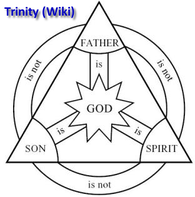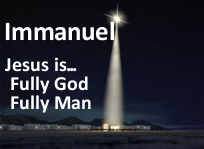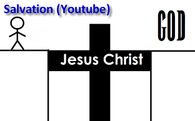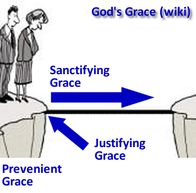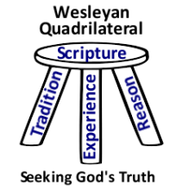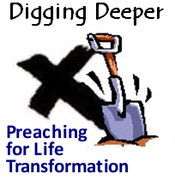Beliefs
|
God: There is one God (monotheism vs. atheism - “no god” or polytheism - "many gods") who wants to be known (as opposed to agnosticism that says “god cannot be known”). We share this belief with two other faiths – Judaism from whom Christianity comes (32AD) and Islam (570AD).
The Shema: We affirm Judaism's core belief about God: “Shema Israel Adonai Eloheinu Adonai Ehad” – “Hear O Israel, the Lord is our God, the Lord is One” (Deuteronomy 6:4). The Trinity: One God Who eternally exists as 3 distinct Persons — Father, Son, and Holy Spirit. The Bible speaks of the Father as God (Philippians 1:2), Jesus as God (Titus 2:13), and the Holy Spirit as God (Acts 5:3–4). The Father sent the Son into the world (John 3:16). The Son redeemed creation (Romans 8:20-21) and revealed God’s Will (Luke 10:22). The Holy Spirit is sent into the world to continue Christ’s redemptive work (Galatians 4:6). Jesus: God’s only begotten (born into creation) Son (John 1:14). He is fully God and fully man (the theandric union). Born of the virgin Mary (Matthew 1:18) with the purpose of Salvation (Matthew 1:21). Jesus revealed God’s nature and will (John 17:25-26). He was crucified for our sins – to bridge the gap between us and God (1 Peter 3:18). He rose from the dead (Luke 24:6-7), was experienced by many (1 Corinthians 15:3–7) and returned to heaven (Acts 1:10-11). He will come again this time to judge the living and the dead (1 Thessalonians 4:14). Creation: God created (Genesis 1:1) everything (Colossians 1:16) and sustains all that exists (Hebrews 1:3). God exists apart from creation (transcendent, Isaiah 55:9) and is actively involved in creation (immanent, Deuteronomy 4:7). The Fall: God’s creation was “very good” (Genesis 1:31) but it was not “locked in.” Change was possible because God created man (Genesis 1:27) for His glory (Isaiah 43:7). And, for love and praise to be genuine, God gave mankind Free Will (Joshua 24:15). We choose our way over God’s way – that’s sin and it separates us from God (Isaiah 59:2). Salvation: We are born as self-centered (sinful) creatures in a self-centered world (Romans 3:23). There is nothing we can do or refrain from doing that will make us “right” with God – change our self-centered nature into a God-focused nature (Matthew 19:25-26). God must do this. New Nature: We need a new nature that must be given to us (John 3:5-7). This earth and each of us has an expiration date – everyone dies. Our old nature is part of this natural order and will not fit into eternity (heaven) with God (Revelation 21:27). We all can receive this new nature by accepting Jesus Christ as our Lord and Savior (Romans 3:22). The Work of Salvation: I was saved (2 Timothy 1:9) by Christ’s work on Calvary’s Cross; I am being saved (1 Corinthians 1:18) as Christ’s character is formed in me; I will be saved (1 Thessalonians 4:16-17) when Christ returns and this age ends. Grace: All of creation experiences God’s nature as grace – God’s unmerited favor. We don’t deserve it, can’t earn it, or lose it – but, we can push grace away. Just like an umbrella can’t stop the rain but it can keep you dry even if everyone else is soaking wet. You can ignore, even defy, God’s grace because His nature is to love you enough to respect your choices. Experience of Grace: We experience God’s grace in 3 ways: Prevenient Grace – God’s love and care for all of creation (Titus 2:11-14); Justifying Grace – God’s love and care for His adopted children - those who accept Jesus as Lord and Savior (Romans 3:23-25); and Sanctifying Grace – The Holy Spirit growing Christ’s character in us – dying to self, living for Jesus (Gal. 2:20). The Bible: The Bible is the inspired (2 Timothy 3:16-17) word of God. The Holy Spirit inspired the original writers (2 Peter 1:20-21) and those who read Scripture today (2 Corinthians 2:12-14). It was written over 1,600 years, on 3 continents, in at least 3 languages (Aramaic, Hebrew, and Greek) by 40 authors. There are many good translations that you can use to fulfill its purpose: “To teach us what is true and to make us realize what is wrong in our lives. It straightens us out and teaches us to do what is right. It is God's way of preparing us in every way, fully equipped for every good thing God wants us to do” (2 Timothy 3:16-17). The Quadrilateral: The founder of Methodism, John Wesley, used four sources in understanding and applying God’s will to life. Albert C. Outler in his John Wesley lists them as: Scripture (Acts 17:11), Tradition (1 John 4:1), Reason (2 Timothy 2:7), and Experience (Proverbs 18:17) but he cautioned that Scripture is primary, it is not an equilateral. |

